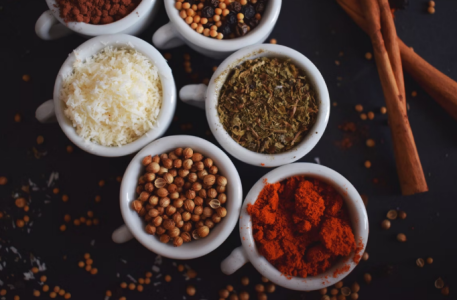These everyday spices could help kill viruses and beat colds, experts claim
- Replies 0
Many people turn to over-the-counter medicines the moment they feel a sniffle coming on, but one expert says there may be a simpler answer hiding in plain sight.
His advice has raised eyebrows but also curiosity about whether old-world remedies could be key to modern health.
He believes some of the most common kitchen spices can be stronger than prescribed treatments. The conversation he sparked has people revisiting what they keep on their spice racks.
Herbalist Simon Mills appeared on The Diary of a CEO with Steven Bartlett and shared his belief that everyday ingredients can fight illness.
He credited ginger, chili, turmeric, cinnamon and garlic as “the household ingredients that can kill most viruses.”
He insisted that when used properly, these plants could be more effective than medications commonly prescribed.
Mills emphasized their potential not only for fighting colds but also for supporting long-term health like cardiovascular function.

When asked about colds specifically, Mills pointed to a simple recipe involving ginger and cinnamon. He recommended grating a thumb-sized piece of ginger root into a mug along with a stick of cinnamon, then steeping the mixture in hot water.
“You can feel it warming straight away,” he said, describing how the combination helps open blood vessels and clear sinuses. He added that ginger stimulates the body’s natural reflexes to loosen mucus and bring up phlegm from the lungs.
Mills elaborated on why these particular spices hold power in his view. Ginger is prized for antioxidant, anti-inflammatory and anti-nausea properties, and its heat raises body temperature to fight congestion.
Cinnamon, he explained, not only helps with digestion but also supports respiratory relief and eases pain. Used together, he argues, they offer a natural way to combat colds without turning to antibiotics.
Also read: 7 dietitian-approved breakfasts that can supercharge your morning
Turmeric was another star on his list because of its active compound curcumin, which he described as a powerful anti-inflammatory. By cutting open turmeric, he said, “you get curcumin,” making it an easy option for everyday health.
He added that including turmeric in meals regularly may help the body fend off chronic inflammation. Mills underscored that while extracts are often studied, small daily amounts in food could still bring benefits.
Garlic rounded out his favorites, especially when eaten raw. He called it a “very powerful prebiotic” that supports healthy gut flora.
According to him, garlic strengthens the immune system by improving the balance of bacteria in the digestive tract. He encouraged people to think of it as a staple for prevention, not just a seasoning for flavor.
Also read: Could this common pantry snack help slow aging? Scientists say yes—if you eat it whole
Mills did not shy away from comparing his recommendations directly to western medicine. “ encourage people not to ask the doc for an antibiotic and use some of these at-home, easy, and free treatments instead,” he said.
He argued that many antibiotics are overused, and common spices could often play a gentler but effective role. His comments highlighted a growing trend of people seeking natural remedies before turning to pharmaceuticals.
Still, Mills acknowledged that research is ongoing and that much of the scientific study uses stronger doses than found in everyday cooking.
Experts at Johns Hopkins Medicine caution that herbal supplements can interact with conventional drugs and should not be taken without guidance.
Doctors stress that herbal remedies should not replace professional medical advice. The FDA treats these supplements as foods, not medicines, so their quality and safety standards are different.
Read next: Experts reveal the protein-packed food that supports heart health after 60

So the question remains: are these household spices really nature’s medicine cabinet, or should they simply complement modern treatments? Would you try ginger and cinnamon tea the next time you feel a cold coming on, or do you trust pharmaceuticals more? Share your perspective and let us know if you think these everyday spices could change the way we fight common illnesses.
His advice has raised eyebrows but also curiosity about whether old-world remedies could be key to modern health.
He believes some of the most common kitchen spices can be stronger than prescribed treatments. The conversation he sparked has people revisiting what they keep on their spice racks.
Herbalist Simon Mills appeared on The Diary of a CEO with Steven Bartlett and shared his belief that everyday ingredients can fight illness.
He credited ginger, chili, turmeric, cinnamon and garlic as “the household ingredients that can kill most viruses.”
He insisted that when used properly, these plants could be more effective than medications commonly prescribed.
Mills emphasized their potential not only for fighting colds but also for supporting long-term health like cardiovascular function.

These everyday spices could help kill viruses and beat colds, experts claim. Image source: Andra Ion / Unsplash
When asked about colds specifically, Mills pointed to a simple recipe involving ginger and cinnamon. He recommended grating a thumb-sized piece of ginger root into a mug along with a stick of cinnamon, then steeping the mixture in hot water.
“You can feel it warming straight away,” he said, describing how the combination helps open blood vessels and clear sinuses. He added that ginger stimulates the body’s natural reflexes to loosen mucus and bring up phlegm from the lungs.
Mills elaborated on why these particular spices hold power in his view. Ginger is prized for antioxidant, anti-inflammatory and anti-nausea properties, and its heat raises body temperature to fight congestion.
Cinnamon, he explained, not only helps with digestion but also supports respiratory relief and eases pain. Used together, he argues, they offer a natural way to combat colds without turning to antibiotics.
Also read: 7 dietitian-approved breakfasts that can supercharge your morning
Turmeric was another star on his list because of its active compound curcumin, which he described as a powerful anti-inflammatory. By cutting open turmeric, he said, “you get curcumin,” making it an easy option for everyday health.
He added that including turmeric in meals regularly may help the body fend off chronic inflammation. Mills underscored that while extracts are often studied, small daily amounts in food could still bring benefits.
Garlic rounded out his favorites, especially when eaten raw. He called it a “very powerful prebiotic” that supports healthy gut flora.
According to him, garlic strengthens the immune system by improving the balance of bacteria in the digestive tract. He encouraged people to think of it as a staple for prevention, not just a seasoning for flavor.
Also read: Could this common pantry snack help slow aging? Scientists say yes—if you eat it whole
Mills did not shy away from comparing his recommendations directly to western medicine. “ encourage people not to ask the doc for an antibiotic and use some of these at-home, easy, and free treatments instead,” he said.
He argued that many antibiotics are overused, and common spices could often play a gentler but effective role. His comments highlighted a growing trend of people seeking natural remedies before turning to pharmaceuticals.
Still, Mills acknowledged that research is ongoing and that much of the scientific study uses stronger doses than found in everyday cooking.
Experts at Johns Hopkins Medicine caution that herbal supplements can interact with conventional drugs and should not be taken without guidance.
Doctors stress that herbal remedies should not replace professional medical advice. The FDA treats these supplements as foods, not medicines, so their quality and safety standards are different.
Read next: Experts reveal the protein-packed food that supports heart health after 60
Key Takeaways
- He credited ginger, chili, turmeric, cinnamon and garlic as the household ingredients that can kill most viruses.
- According to him, garlic strengthens the immune system by improving the balance of bacteria in the digestive tract
- He added that including turmeric in meals regularly may help the body fend off chronic inflammation
- Doctors stress that herbal remedies should not replace professional medical advice.






